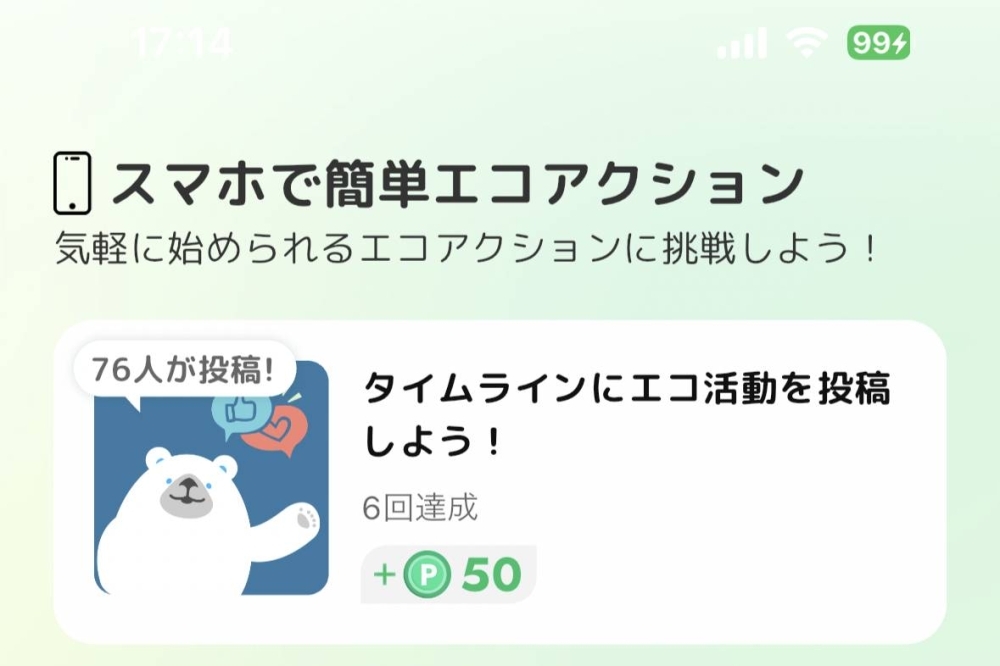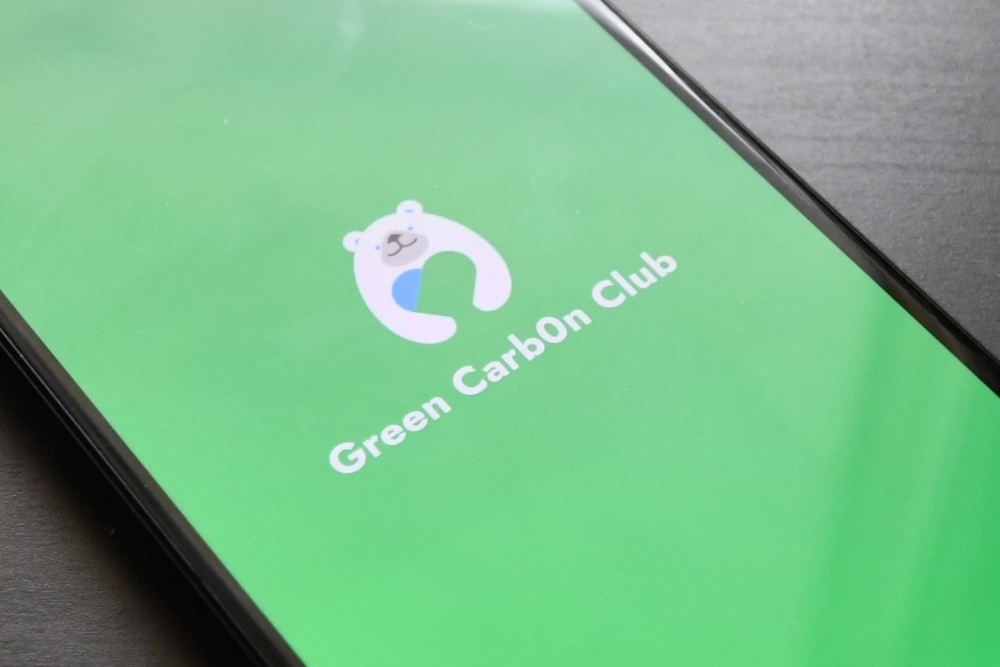When we think of making a positive contribution to the environment, we might not immediately think of our phones, but as gamification creeps into our daily activities, researchers and developers are examining the potential for apps that spur greener behavior.
Gamification, which sees game-like elements and principles applied to other contexts with the aim of boosting user engagement, has manifested itself in productivity apps, exercise trackers and language-learning tools. When you earn a digital badge, “streak” or other little emblems of progress, that is gamification in action — a proven motivator for shifting behavior.
Gamification deployed for an environmental outcome is not new — it has long been used as a tool by educators and as a way to gather scientific data — but it has gained extra momentum in Japan in recent years.
Government funding has helped drive a boom in environmental and social app development, with these programs ranging from tools to help shift behavior by encouraging water bottle refills to initiatives where users earn credits for green shopping habits. But whether these products will last beyond trial periods is the big question, experts say, and there are some doubts about just how big of an impact they can have.
Play the game
Many people in Japan are already familiar with a sort of gamification — ubiquitous point cards that offer rewards for loyal shoppers.
“In Japan, we like a point card — the point economy is very familiar,” says professor Yutaka Arakawa of the HumanoPhilic Systems Laboratory at Kyushu University, who researches and works on projects that examine the various ways technology can shift human behavior.
He notes that while this is not a game as such, the notion of collecting points for a reward is a gamified system. As a mechanism, this “works well for changing human behavior.”
But there are other incentives that can also be effective.

With Kawasaki and Fujitsu’s Green Carb0n Club app encouraging eco-friendly lifestyles, users accumulate points, which can be exchanged for coupons, through actions such as attending events, posting on the app and answering surveys.
| Courtesy of Fujitsu
Research by Arakawa and Yuki Matsuda, a lecturer in the Faculty of Environmental, Life, Natural Science and Technology at Okayama University, found that users wanting a product to improve or help solve a problem may be willing to volunteer their time in order to do so. In the case of Wikipedia and the unpaid users who update it, one of the drivers for doing this was a sense of improvement of the product overall, with those who contributed hoping to benefit from this themselves.
Money is typically not the motivator for gamified apps that aim for socially beneficial outcomes — rather, they tap into our less self-centered side. The altruistic aspect of a point system that results in a positive monetary outcome — for a charity of choice, for example — can keep user motivation high.
Another way individual users can have an impact through the use of gamified apps is by collecting and submitting data, with such apps increasingly becoming powerful tools for research. Private groups focused on everything from bird-watching to shark movements are providing valuable community-sourced data — and collecting digital rewards or ticking off checklists in the process — drastically changing the way scientists understand and study the environment.
But while use of these apps typically stems from a person’s curiosity, in order to coax people to change their behavior, more creativity and an incentive is often needed.
A challenge that Matsuda’s students were recently looking to solve was how to boost participation in collecting litter. By using a tong with a camera and GPS system attached, they hoped to gather data and record patterns of rubbish and “draw a garbage map.”
But in order to make participation more enticing, the researchers had to develop a reward system.
“When you pick up the garbage, then the system makes a sound like something from Mario,” Matsuda explains, noting this provides encouragement and that a small piece of recognition helps feed into a sense of satisfaction.

Commuters outside Tsurumi Station in Kawasaki on March 15. The aim of the city’s Green Carb0n Club app is to “speed up the decarbonization movement in the city.”
| Bloomberg
When designing apps that seek to adjust human behavior, researchers have also found an important component is a sense of consent or buy-in from users.
In a Scientific Reports paper published in December, researchers in Beijing found that gamified environmental apps appealed to users’ need for a sense of autonomy, thereby bolstering eco-friendly decision-making. Ultimately, the researchers found that gamification “can be an active strategy for encouraging green consumption behavior, as it provides users with immediate feedback, social recognition, and intrinsic motivation to engage in sustainable behaviors.”
While gamified apps are designed to alter user behavior, people want to feel like they have freedom, even in the face of these tools.
In part this is because “voting is a natural behavior,” Arakawa says, as it feeds into our sense of satisfaction.
Green points
In an early example of gamified environment-themed apps in Japan, the 2030 SDGs Game — themed around the United Nations’ Sustainable Development Goals — was released in 2016. In the multiplayer card-based game, players pursue assigned goals, shaping the development of the world through 2030.
Points — perhaps inevitably — loom large, with separate initiatives by both the Environment Ministry and e-commerce giant Rakuten rewarding individuals for making eco-friendly choices, for example by donating unwanted clothes or purchasing energy-efficient appliances.
The potential for apps to shift behavior en masse makes them enticing for local governments — like officials in Kawasaki, which worked with Fujitsu on the Green Carb0n Club app.
In it, users accumulate points through actions such as attending events, posting on the app and answering surveys, with people ranked by their contribution. Those points can be exchanged for coupons, which in turn can be spent on eco-friendly products and services.

The homescreen of the Green Carb0n Club app
| Courtesy of Fujitsu
The aim of the app is to “speed up the decarbonization movement in the city,” Kawasaki Mayor Norihiko Fukuda said in a statement, adding that the city had previously utilized apps to help achieve this aim.
Keisuke Ikeda, director of the Cross Industry Business Office in Fujitsu’s Solution Transformation Unit, said the trial had shown promising results, with around 1,500 downloads of the app.
“Certain behavior change was confirmed through gamification,” as “small recommendations and empathy generated within the community function led to raise general … awareness toward environmentally friendly lifestyles,” Ikeda says.
Making a difference
Still, individual behavior has a minimal environmental impact compared with the actions of large, high-polluting conglomerates, which have often sought to deflect responsibility.
For example, oil giant BP, with the help of public relations firm Ogilvy & Mather, was successful in shifting focus to individual responsibility with their promotion of the “carbon footprint” concept in the mid-2000s.
While the notion of personal responsibility serves corporations well, demonstrating environmentally conscious behaviors and broadcasting concerns and disseminating information in person and online can influence social groups and help form like-minded communities.
But a July 2017 paper by researchers in Milan found that, while gamification as a method could encourage energy-saving behavior, people were very inconsistent in the choices they made.
“Performing one green behaviour does not necessarily lead to correlated ones,” the researchers wrote. “For example, someone who is good at recycling may not care about the environment when choosing transport.”

The loading screen of Green Carb0n Club, developed by Fujitsu and the city of Kawasaki, is displayed on a smartphone.
| Chris Russell
In this way, apps may end up playing whack-a-mole with environmental problems, meaning they could be limited in imparting large-scale change. Experts say it is often challenging to build a user base and maintain engagement for a prolonged period of time. In addition, the introduction of different apps could lead to a fragmented audience.
Indeed, if there is one app that users gravitate toward, it may be effective, but a whole series of different apps are likely to have a more limited effect, Arakawa says.
In a world of fragmented funding, a super environmental app that brings together all the components of sustainable behavior remains elusive. Still, apps may be effective in engaging individuals and helping them feel somewhat empowered in relation to an issue — a particularly strong concern when fatigue and depression have become major hurdles when it comes to maintaining environmental action.
Additionally, eco-fatigue — the sense that environmental problems are too far advanced for individual action to be meaningful — can see once-engaged people fall out of sustainable habits.
Experts say gamified tools can offer a way for people to reengage with environmental issues by fostering a sense of community and building positive associations around the issues at hand.
In a 2021 paper, researchers in Austria wrote that “by integrating these playful elements, a complex topic such as sustainability can be brought closer to people. For sustainability issues, this method can thus significantly support the communication of important topics to the general public.”
What’s more, apps can offer a reminder of the contribution we make. Indeed, Arakawa says we may feel we are not making environmentally conscious choices in our daily lives, even though we are.
He notes that general questions about eco-friendly behavior can yield different results to ones about particular actions, pointing to a recent poll investigating whether people’s behavior was aligned with the Sustainable Development Goals. Around 10% of respondents said that their actions were, while 90% said no, but when the question was changed to specifics, a different picture emerged — 90% said yes to the question “Do you bring your own bag to the supermarket?”
“(We) unconsciously already contribute, but don’t recognize these contributions,” Arakawa says. Apps that help track behaviors can help us to be more conscious of our actions and help us to “visualize our contribution.”
“If you walk, and the application says you are contributing to reducing the CO2 (carbon dioxide) … the person can feel this contribution, and can contribute more.”

